Cheap phone networks can be faster than 'proper' ones in London
Plus: Your London politics news briefing.
Sometimes London Centric brings you investigations into the darker side of life in the city (we’re still looking into the mystery of the Tesco car crasher of Stratford…) and sometimes we just like to bring you information that makes your life as a Londoner a bit easier.
We’ve been obsessed with the poor quality of the capital’s mobile signal for a while. We’ve explained how a toxic combination of planning laws, NIMBYism and lack of investment mean you can’t get a data signal in large parts of the capital. We’ve also revealed why your phone is often lying to you about its ability to access 5G in London.
Now we’ve got the results of a mass survey on how different mobile networks perform in the centre of the capital — and why a contract with a cheap network might be even more reliable on a night out in Soho than some of the mainstream operators.
Scroll to the end to find out which network performs best in central London — we’ll be back this weekend with another investigation.
We rely on paying members to fund London Centric. Every extra subscription helps us carry out more original reporting about the capital.
What’s gone on this week in London politics.
Sadiq Khan breaks ranks with Labour leadership and says Israel is committing genocide in Gaza.
The mayor of London has previously gone out of his way to avoid directly using the term ‘genocide’ to describe Israel’s actions in Gaza. At times he has attributed the term to others during media appearances. This included a recent testy exchange with London Assembly member (and new Green Party leader) Zack Polanski.
Last night Khan decided to change his language, using a public Q&A in west London to state: “I think what's happening in Gaza is a genocide.”
He told the People's Question Time, organised by the London Assembly: “20,000 children have starved because of the policies of the Israeli government. When I see the health system in Gaza collapsed, when I see the lack of supplies reaching people in need, when I see the famine that is man-made, when I read the interim judgement of the ICJ and then see the UN commission report… It’s inescapable to draw the conclusion that in Gaza we are seeing, before our very eyes, a genocide.”
London Conservative leader says Tommy Robinson marchers were “not political at all”.
London Conservative leader Susan Hall used the same event, held in White City, to defend last weekend’s Tommy Robinson-led march through central London.
Khan had earlier told the event: "There were tens of thousands of people at the march on Saturday who were not far-right. But the march was organised by the far-right."
Hall, who has joined a campaign calling for the deportation of hundreds of thousands of legally-resident Londoners back to their country of birth, told the audience that “we are sick to death of being called the far-right”.
She said the 100,000-plus people who went on the “Unite the Kingdom” march were “not political at all” and are just “very, very fed up with this Labour government”. Hall, who waved a union jack from the event stage, added: “The fact they’re carrying the union flag or the St George’s flag doesn’t mean anything other than they’re proud of their flag, as am I.”
Turning to Khan, the Conservative leader said: “They’re not far-right and I wish you’d stop calling people far-right.”
Former Islington councillor charged with blackmail was elected after alleged offences were national news.
Ollie Steadman, a 28-year-old former Labour councillor in Islington, has been charged over the ‘Westminster Honeytrapper’ scandal after a number of prominent MPs, aides, and political journalists received messages soliciting explicit pictures on WhatsApp and dating app Grindr. On Wednesday the Crown Prosecution Service said Steadman is facing blackmail and communications charges. He is due in court on 3 November.
Steadman was first elected in May 2024 to represent Islington’s Hillrise ward, which sits between Archway and Finsbury Park. That’s after the alleged offences took place and after they had already become national news. Following his arrest the following month, which was not made public, Steadman stood down as a councillor after just 69 days in office. Labour retained his council seat in the subsequent by-election, with no explanation offered to the public as to why the by-election had been called.
OK, but can we avoid more tube strikes?
The capital’s transport network may have heaved back into life this week, with both the RMT union and Transport for London sounding optimistic about averting further strikes over demands for a shorter working week. A TfL spokesperson said: “We met with the RMT [on Wednesday] and discussed the ways we can further help our colleagues manage fatigue. We invited the RMT to meet with us again on Friday and look forward to continuing our discussions.”
We reported last week how the changes in passenger behaviour brought on by the strike may end up sticking, as Londoners discover new ways to commute — one of several things that could change the balance in negotiations.
Preposterous property of the week
This week’s dive into the capital’s property market is a four-bedroom £2.45m experiment in the strangest possible adaptation of a London terraced house. It looks like a standard 19th-century London suburban property but, as the estate agent explains, behind the scenes is an entire house “newly built to an exacting standard behind the original Victorian façade”.
The house, just off Kilburn High Road, north west London, suggests the developer has a deep love of black and silver. The house listing (sent in by a London Centric reader who lives nearby and requested anonymity for fear of neighbourhood retribution) features a garage visible from the living room where you can park your sports car and admire it while having a morning coffee. There’s also a collection of fairly extraordinary artworks on the wall.
Which phone network is actually fastest in central London?
If you live or work in central London then you might get a faster connection from a cheap third party “virtual” network than from some of the major providers.
That’s according to a new piece of research by mobile data firm PolicyTracker, who carried out tens of thousands of speed tests earlier this year and shared the capital-specific part of their findings with London Centric.
“Most users wouldn't notice a difference in central London,” said Cameron Hill of PolicyTracker, who carried out the research. “And really [a virtual network] is better value.”
Anyone want a Millwall FC SIM card?
To understand what’s going on, you first need to know that there are four ‘real’ phone network operators: Vodafone, EE, O2, and Three.
They have all invested tens of billions of pounds over the years in their own physical networks of masts and behind-the-scenes communications networks, which enables people to connect to the internet, stream Netflix on the train, and load local London news outlets on their mobile phones.
These phone networks then lease some of their spare capacity to ‘virtual’ networks. These include everything from TescoMobile, for people who like to pick up a SIM with their weekly shop, to the newly-launched Millwall FC Mobile, for people who want a south London football team to provide them with a data package.
On the whole these challenger networks tend to be substantially cheaper and aimed at more cost-conscious consumers than the established brands.
What the researchers found was, after carrying out thousands of tests in central London, the virtual networks can be as fast as the real networks they rely on — and in some cases could even be faster.
They compared:
Lebara, which uses Vodafone’s network
iD, which uses Three’s network
Giffgaff, which uses O2’s network (and is also owned by O2)
Lycamobile, which uses EE’s network
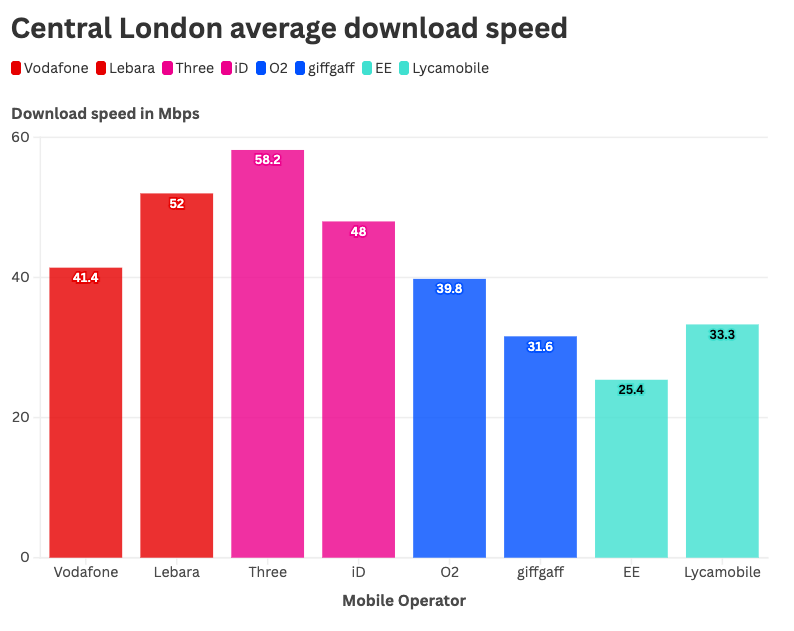
In the tests they found that Lebara outperformed its parent network Vodafone on download speeds in central London, while charging 70% less. A similar story could be found with Lycamobile and its parent network EE.
The established networks could pull ahead again on speed as a new type of 5G, known as 5G standalone, becomes widely available. That’s because none of the cheaper virtual networks have access to this technology, according to Hill. But for now, there’s not much in it — and most users wouldn’t notice the difference.
Speed isn’t everything.
This is where things get interesting when it comes to choosing a network.
As we’ve explained before, the main complaint in central London isn’t about download speeds — it’s about the battle to get any data connection at all .
Even if your phone is displaying bars on its screen, which indicate it can connect to a nearby mast, the network might not have the capacity to provide a functioning connection.
This presents itself to the user as either the very delayed loading of a piece of content — or no download at all, and the spinning wheel of doom on your WhatsApps. If you’re trying to do an activity that requires a stable connection, such as a video call, it can make the network effectively useless.
This is where the main networks have an advantage, with almost all of them outperforming their third party equivalents. Vodafone and EE are neck-and-neck when it comes to the lowest proportion of failed tests, with O2 just behind.
The one glaring exception was Three, with its network in the heart of the capital repeatedly failing. It was outperformed for stability by the virtual iD network, which uses Three’s own network.
"If I told you that the speed of Three and iD were effectively the same, and you might in certain cases be getting a better experience on iD for half the price, a lot of people would be swayed,” said Hill. ”You're looking at very, very small differences that may not actually impact user experience too much.”
This might change, as Vodafone and Three are now owned by the same company and are in the process of merging their network.
Roaming suburban boys.
When the tests were recreated in a stretch of suburban south London, where there are fewer people and the buildings are less dense, the speeds across the board were substantially higher.
This shows how much easier it is to provide a good mobile connection on the fringes of London, where it’s easier to put up masts — and the challenges networks face when it comes to providing a connection in the heart of the capital.
Overall, Hill said it was time for Londoners to ask whether they need to spend so much on a contract with a mainstream network — or whether they should jump ship to a less well-known operator for a fraction of the price.
For many people, he argued, the virtual operators are neck-and-neck in terms of service for the average Londoner, while also being substantially cheaper: “People tend to look down on them but you will get good quality. You will get a good experience.”
If you want to get in touch with London Centric then message us on WhatsApp or email — or click below to leave a comment.



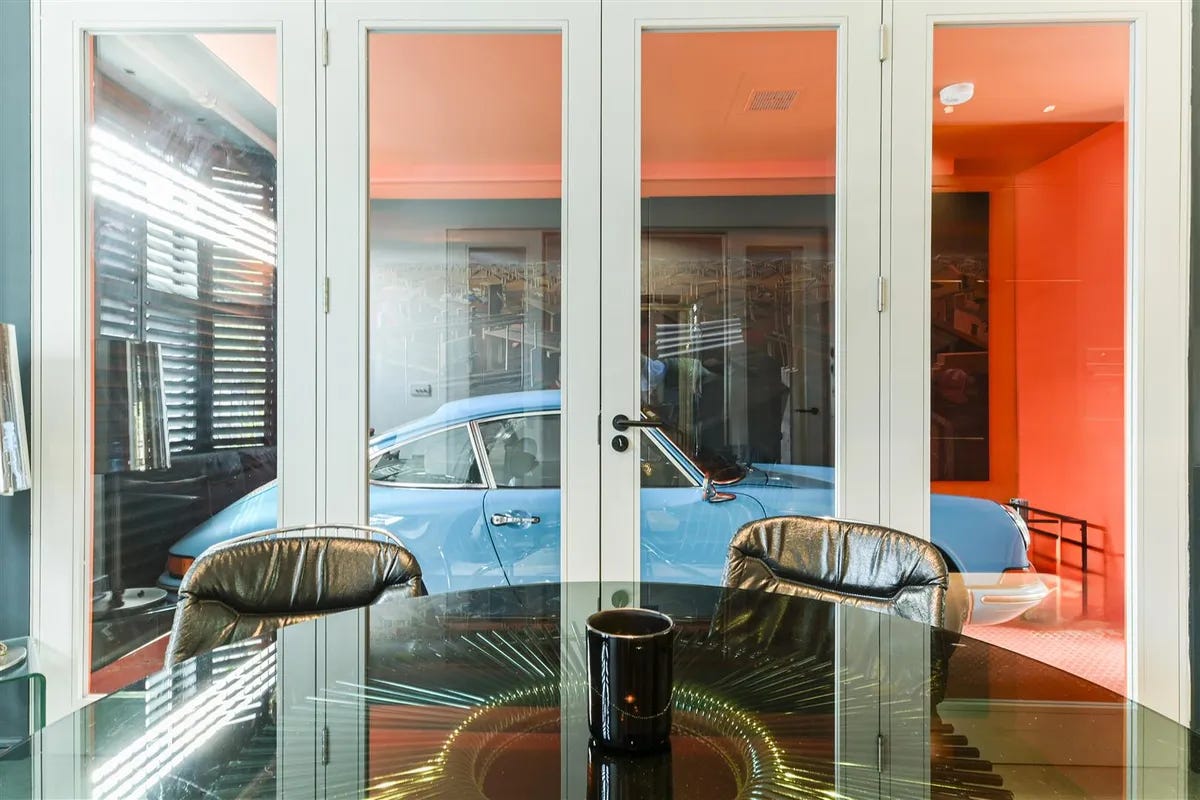
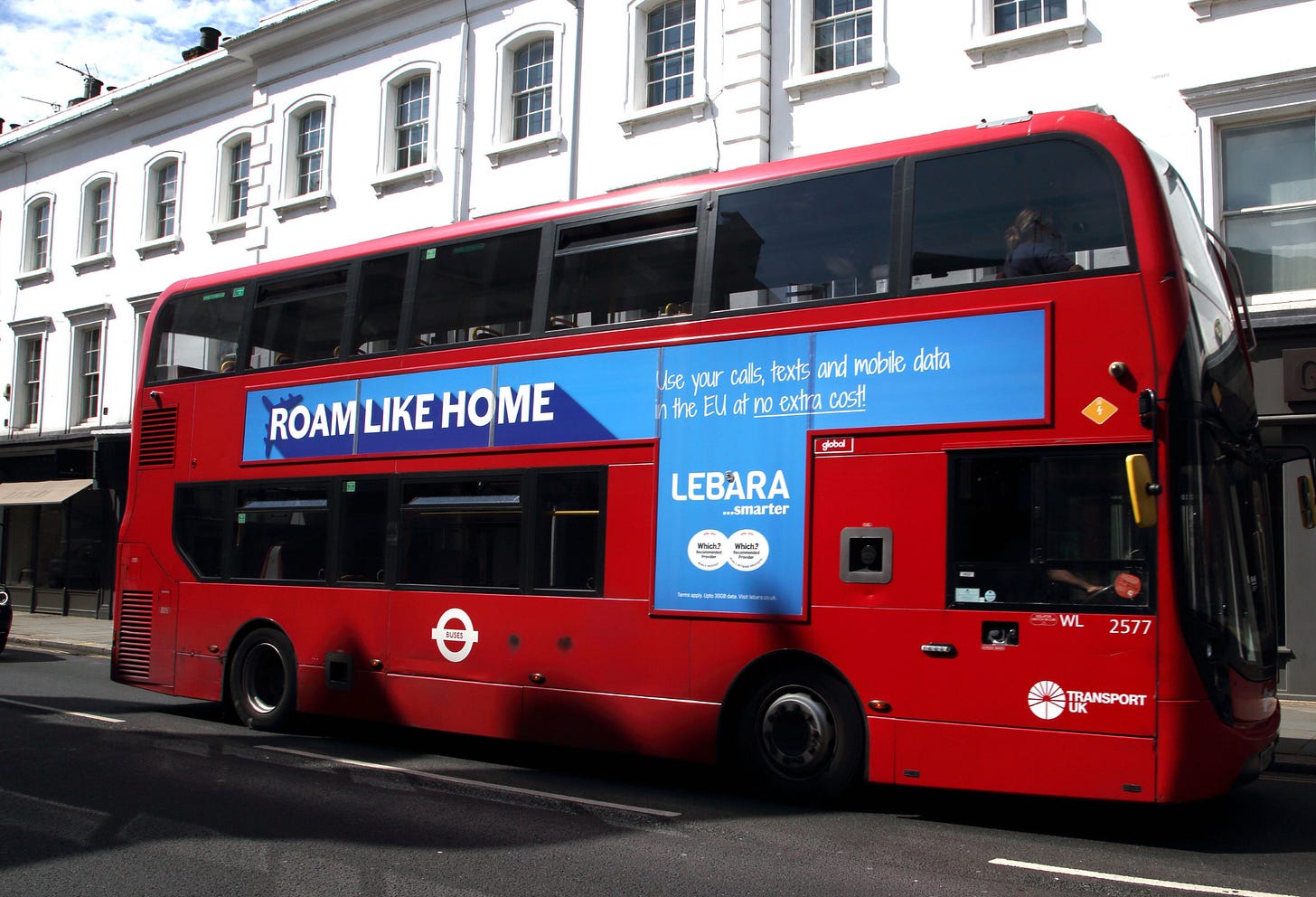
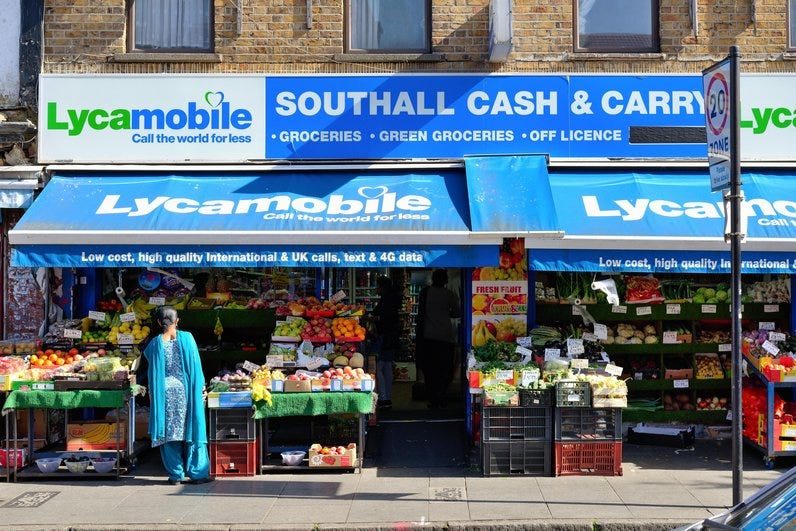
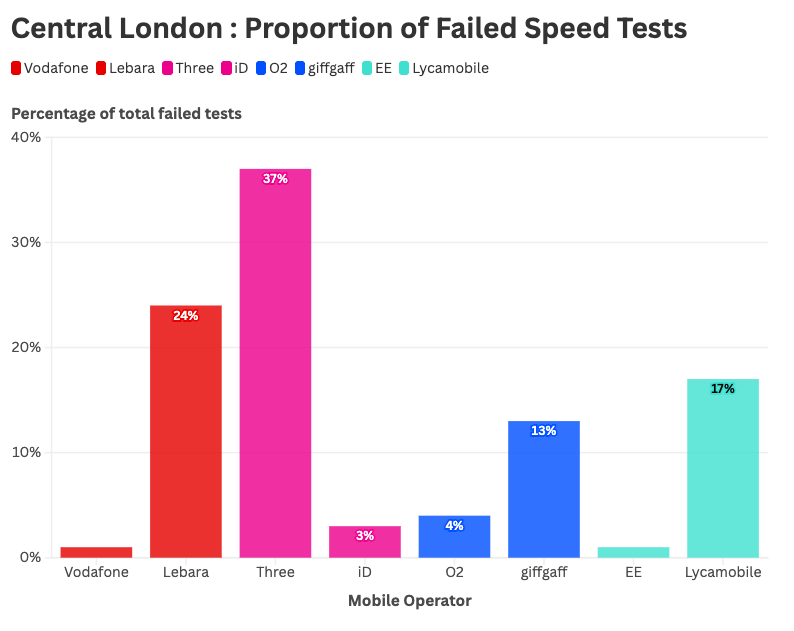
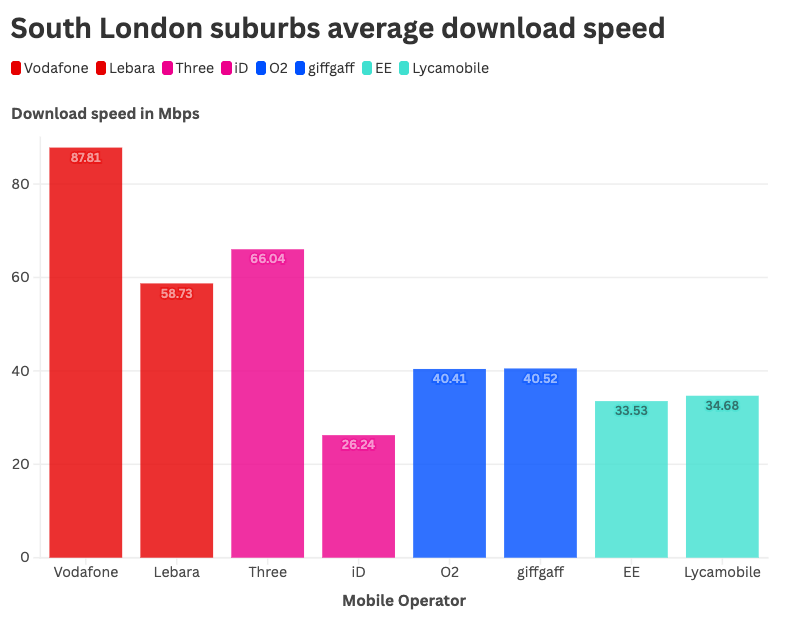
If Susan Hall’s feelings are hurt by Khan accurately describing her political leanings, that’s not really his problem. You can’t advocate for mass deportations and seriously think that you’re not on the far right of the political spectrum.
The very same Susan Hall who was sharing extreme racist jokes against Khan? The very same person attacking minotiries and legal migrants in London? She is a caricature and it's so lovely to see her seething, London showed by voting democratically that her hatred has no place here. Maybe she should try Clacton. Besides, she doesn't even know how to use public transport here.